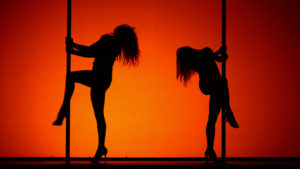Sex work is work. Accept the proposition; start from there. The next question is: what kind of work, with what compromises? Very good work, if you listen to the porn performers interviewed in Netflix documentary Money Shot: The Pornhub Story. Theirs is not just a job, but a job that brings people pleasure — and, they say, sometimes allows them to experience some of that pleasure on their own terms.
Since the advent of “content creator” platforms like the one offered by Pornhub, it can also be a very well-paid job. One performer, Wolf Hudson, explains how he went from earning $4,000 a month working for porn studios, to well over $10,000 as a free agent monetising his work through Pornhub’s Modelhub service, which launched in 2018. “Content creation has shown that performers have always been in charge,” he says. “Without us, there would be no industry.”
For Milf performer Cherie DeVille, Modelhub was a source of “autonomy, power, a good bit of money”. Siri Dahl says it’s the reason she was able to buy a house. More than that: she credits her porn work with giving her, as a survivor of sexual abuse, an arena in which she had full control of her sexuality. “Like, one of my favourite things about the industry I work in is the fact that we care about consent.”
Through Modelhub, verified performers can collect a share of the revenue from ads served against their videos. They can also charge consumers for downloads or custom videos. Essentially, it was an answer to the problem that had been stalking porn since the internet decimated the industry in the Noughties: how the hell was anyone going to earn money from making it? Which means that Modelhub was Pornhub’s answer to a problem Pornhub had played a significant role in creating.
By the time Pornhub was founded in 2007, the porn industry — like the music industry and Hollywood — was already foundering under pressure from the internet. Porn had done very well out of the VHS era — some histories even credit it with VHS’s victory over Betamax in the format wars — and had been expected to do equally well from DVDs. But DVDs arrived at roughly the same time as the mass internet, meaning that porn was, suddenly, everywhere all of the time. And all of it was free.
Previously, consumers had expected to be ripped off for their porn, handing over fistfuls of dollars for a handful of scenes strung together. Now they could download an illegal torrent of anything they could imagine, a process made simpler by the foundation of the “tube” sites, which allowed users to upload their own videos — or anyone else’s. It wasn’t in the sites’s interests to police copyright violations, since they made their money by serving ads, and more videos simply meant more eyeballs, which meant more profit. So, the late Noughties were a golden age of pornography for almost everyone involved, apart from the people who actually made it.
In a 2009 sketch of life in “the Valley” (the San Fernando Valley in LA County, where porn studios have historically made their home), the writer Susannah Breslin charted a bleak scene. The producers, nearly all men, were largely despairing of turning a profit, as they competed against pirated versions of their own work; the ones who did were those willing to push their scenes to greater and greater extremes of shock and violence. The women who participated talked, not about liberation and empowerment, but about their debt and shame. One female performer told Breslin, through tears: “It is kind of wrong, I think, and it’s very degrading, I think, and it’s just — I need the money that bad.” She made $500 for a shoot.
At the time Breslin was writing, at least, porn was not an industry that universally “cared about consent”. It’s a principle that often seemed to be honoured more in the breach, through scenes that eroticised the coercion and rape of women. A woman who says “yes” to being beaten and fucked on camera because she needs $500 to get through the next week is hardly offering her free and happy participation.
The “sex work is work” position sometimes attempts to negate experiences like this by trying to argue for continuity between sex work and other forms of labour. “Maybe the difference is the contact or the penetration?” argued a 2015 post by the academic Lisa Wade. “But there are other jobs that centrally involve bodies and some involve kinds of penetration. What about the dentist climbing in your mouth?”
This would be a more robust comparison if dentists were paid for allowing us to climb into their mouths rather than the other way around, if PPE wasn’t required in dental surgeries, if the average dentist’s salary wasn’t upwards of $200,000, and if more dentists ended their shifts crying about the degradation of it all. It only holds if there’s nothing uniquely valuable about sex, and yet the sex industry would not exist if there was nothing uniquely valuable about sex.
More convincing, perhaps, is the argument that sex work can be degrading, but the degradation is a function of a badly structured industry rather than inherent to sex work. And it was Pornhub that decisively changed that structure. Under pressure from tube sites, many of the studios that populated the Valley went bust, at which point Pornhub (or, more specifically, Pornhub’s parent company Mindgeek) was there to buy them out. The result, explained a 2014 Slate article, was “a vampiric ecosystem”: “Mindgeek’s producers make porn films mostly for the sake of being uploaded on to MindGeek’s free tube sites, with lower returns for the producers but higher returns for MindGeek.”
Eventually, though, vampires need new blood. Modelhub was a way to provide this, and the performers could only be grateful for it. After all, it was better to be your own boss than be exploited by a studio. It didn’t matter that Pornhub was the reason their economy had collapsed: the condition of the “content creator” on any platform is one of Stockholm Syndrome, endlessly prostrating yourself to the algorithm gods that profit from your labour.
But Pornhub was still, at base, the thing it had always been: a tube site, with all the problems that implied. There were the copyright breaches, of course, but there was also much worse. “If you let just anyone upload anything,” says DeVille in the documentary, wide-eyed, “you’re going to get anyone uploading anything.” So, there was revenge porn. There were spycam videos, videos of rapes and assaults. There were children. “If you’re interested in the ‘Content Formatter’ job,” warned a Glassdoor post quoted in the 2014 Slate article about Pornhub, “just be aware you’re basically a glorified child porn screener, and you will be watching disgusting videos all day.”
In theory, moderation should have meant that none of this material made it onto the site. In practice, a team of about 30 was attempting to screen between 700 and 1,000 videos a day. Scrubbing through at high speed, with the sound off, it is impossible to tell a simulated rape from the real thing. Even if a video was flagged, there was no guarantee it would be removed: former moderators have said that management discouraged them from pulling popular content. And even if it was taken down, there was nothing to stop it being uploaded again.
Like the performer Breslin had met in the Valley, the moderators doing this work undergo it for money, not desire: it’s easy to joke about “watching porn for a living” until you realise the stuff they were filtering included incest and bestiality. Moderators ended up suffering burnout and panic attacks. As one researcher into the industry has said: “Horrifying labour conditions make free porn possible.”
For a long time, though, Pornhub remained a PR triumph, thanks to a mix of quirky data-mining stories (which state has the most searches for cheerleader? The answer may surprise you), celebrity tie-ins (hello Kanye) and headline-grabbing gimmicks, like sponsoring a snow plough. That finally started to change in 2020 with Nick Kristoff’s New York Times article, “The Children of Pornhub”. Among the horrors he detailed were a missing 15-year-old girl from Florida whose mother found 58 videos featuring her on Pornhub, and a 14-year-old girl from California whose sexual assault was uploaded and seen by a classmate. Because the uploaders of illegal content tended (for obvious reasons) not to be verified users, they couldn’t profit from this material. But Pornhub could still serve ads against it.
In the documentary, the performers sound — for the most part — appropriately horrified that this material existed on the platform where they worked. But what distresses them most of all is the terrible unfairness of their work (on Pornhub) being associated with child sexual abuse footage (also on Pornhub). The documentary doesn’t push this point, but the disjunction still stands: they seem to believe they should have their share of Pornhub’s profits, without responsibility for the abuses that helped underpin them. Plus-size performer Gwen Adora dismisses the reaction to Kristoff’s article — which resulted in payment handlers including Mastercard and Visa cutting off services to Pornhub, and Pornhub deleting millions of unverified videos — as a “Twitter kerfuffle”.
On the one hand, pornographers maintain that the highest value of all is sexual self-determination, embodied in their work. On the other, when women and girls are violated and their violation is compounded by being turned into a masturbatory aid, this is simply a “kerfuffle”. Siri Dahl explains how distressed she was that Kristoff quoted her in his article without mentioning the fact that she’s a survivor of sexual abuse. Her experiences do not seem to have made her more empathetic to women whose abuse happens through porn. If your job relies on a platform that makes money from rape, maybe your job simply shouldn’t exist, however nice it is that it’s enabled you to buy a house.
The porn industry breaks everything down in the end. The studios strip-mined the bodies of performers, then Pornhub strip-mined the studios in turn. But even the winners in the flesh trade — and the performers interviewed for this documentary are undoubtedly in the top tier of their profession — seem to be corroded by belonging to it. Sex work is work, but what kind of work?
A kind of work where sharing a shopfront with child porn is an occupational hazard. A kind of work where the mythology of individualism bleeds into a near-sociopathic solipsism. A kind of work where people become things, and what happens to those things ceases to be anyone else’s concern. A kind of work where the exploitation is baked in, all the way down. Once you accept the proposition, all kinds of moral compromises become possible.
Disclaimer
Some of the posts we share are controversial and we do not necessarily agree with them in the whole extend. Sometimes we agree with the content or part of it but we do not agree with the narration or language. Nevertheless we find them somehow interesting, valuable and/or informative or we share them, because we strongly believe in freedom of speech, free press and journalism. We strongly encourage you to have a critical approach to all the content, do your own research and analysis to build your own opinion.
We would be glad to have your feedback.
Source: UnHerd Read the original article here: https://unherd.com/




